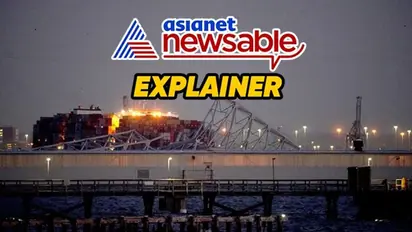Explained: Why cargo ship may have crashed into Francis Scott Key Bridge; will its collapse impact shipping?

Synopsis
As the authorities scramble to assess the casualties and determine the exact cause behind the Francis Scott Key Bridge collapse, shipping experts weigh in on the potential reasons behind the disaster and its ramifications on maritime trade.
In a shocking turn of events, a cargo ship collided with the Francis Scott Key Bridge in Baltimore, leading to its collapse and plunging several vehicles into the river below. As the authorities scramble to assess the casualties and determine the cause, shipping experts weigh in on the potential reasons behind the disaster and its ramifications on maritime trade.
A Singapore-based shipping expert, speaking anonymously to the BBC, highlighted several potential causes for the collision. These include main engine failure, steering failure, generator blackout, or the possibility of human error. He emphasized the importance of rigorous checks before a vessel departs, suggesting that an oversight might have occurred in this instance. Given the immense size of cargo ships, even a slow speed can generate substantial momentum, making any collision impactful.
"The vessel had just departed from berth and made a turn before hitting the bridge. It’s an unusual turn. Before a ship departs, we are supposed to carry out all the checks on all elements of the vessel before it departs. It’s part of the departure checklist. So, if everything was done, something was obviously overlooked," he told BBC.
“These ships are so huge that even if the speed is slow, the momentum would be huge,” he added.
Moreover, concerns have been raised regarding the maintenance of the bridge itself. With a port adjacent to it and frequent ship traffic passing underneath, questions arise about the frequency of structural checks. The collapse of such a critical infrastructure not only poses immediate safety risks but also disrupts maritime activities in the region.
"Having a port right next to the bridge with ships going underneath it all the time – it should have been checked often," the expert added.
Lars Jansen, a seasoned container shipping expert, painted a grim picture of the fallout from the collision between the cargo ship and the Francis Scott Key Bridge. Describing it as a "major disaster," Jansen anticipates significant disruptions for US importers and exporters on the East Coast.
Jansen told BBC that with approximately 21,000 units of cargo needing rerouting through alternative ports due to the bridge collapse, coupled with the trapping of multiple merchant vessels in the port of Baltimore, the implications for regional shipping operations are profound.
While Jansen acknowledges that such an event is unprecedented in his experience, he notes that the global impact may be less pronounced. Nonetheless, he emphasizes that the repercussions will be keenly felt in the affected region, translating into delays and increased costs for maritime trade stakeholders.
In terms of immediate consequences, the rescue operation is underway to locate potential survivors and assess the extent of casualties. Two individuals have been rescued from the waters, but authorities fear more may be trapped. The aftermath of the collision includes a raging fire on the cargo ship, further complicating the situation and posing environmental hazards.
The collapse of the Francis Scott Key Bridge not only disrupts local transportation but also reverberates across the global shipping industry. While the direct impact may be confined to the East Coast, it serves as a stark reminder of the interconnectedness and vulnerability of maritime infrastructure. As investigations into the cause of the collision continue, stakeholders must prioritize safety measures and infrastructure resilience to mitigate future risks.
Check the Breaking News Today and Latest News from across India and around the world. Stay updated with the latest World News and global developments from politics to economy and current affairs. Get in-depth coverage of China News, Europe News, Pakistan News, and South Asia News, along with top headlines from the UK and US. Follow expert analysis, international trends, and breaking updates from around the globe. Download the Asianet News Official App from the Android Play Store and iPhone App Store for accurate and timely news updates anytime, anywhere.